 Indians Archive
Indians Archive  Kinston Insider
Kinston Insider
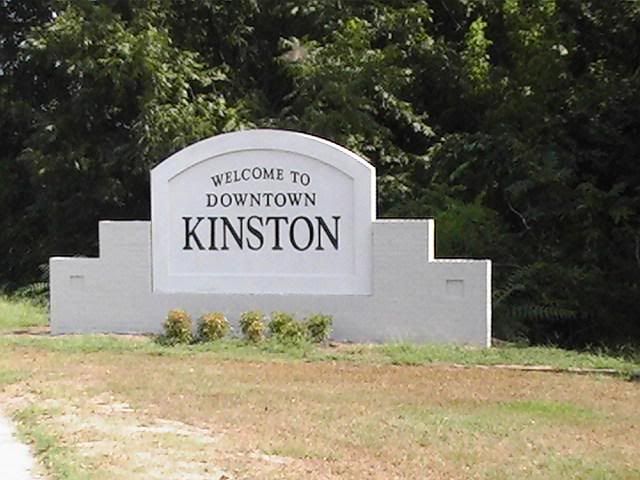
This is the sixth in a series of six articles where in the span of seven weeks from early July until the the end of August I visited all six of the Indians minor league affiliates. I recapped each visit to Winter Haven, Mahoning Valley, Lake County, Kinston, Akron and Buffalo with a short writeup consisting mostly of video and pictures, and also have written several separate articles on players I talked to during my visit.
Kinston, North Carolina.
Having never been there, I had no idea what I was in store for when I visited there a few weeks back on the final weekend of August. After already visiting affiliates in large metropolitan areas in Akron and Buffalo, visiting Lake County which is a bustling area on the outskirts of major metropolis Cleveland, and Mahoning Valley which is located just outside of another major Ohio city in Youngstown, when I stepped off my plane in Jacksonville, NC I knew I was in for something different.
My trip to Kinston started with the arrival in Jacksonville, NC, a military town located about 30 miles outside of Kinston. With Kinston being nowhere near a major airport except Raleigh which is almost two hours away, I had to use one of the many regional airports surrounding Kinston to get there. Jacksonville was a small airport consisting of just three terminals, as when you go through the security check you literally find yourself standing in the terminal. That's how small it is.
After getting my rental car, I headed into Kinston. On my way into town, I found I was definitely out in the middle of nowhere, and in an area much different than the fast-paced lifestyle we live in day in and day out in Northeast Ohio. Local radio stations comprised mostly of country music, and talk radio centered mostly on NASCAR, East Carolina Pirate football, and North Carolina State Wolfpack football.
On my way in, it was pretty much just an open road with houses here and there along the side of the road. There were not any national food or shopping chains in sight, and the only food chain that I saw was McDonald's. I passed by Bill's Used Car Sales, which just happened to be a small ranch house with a long gravel driveway that had two beatup cars parked to the side of the driveway which I would assume were the used cars for sale. Yes, things were certainly different here.
When I finally arrived in Kinston, to my surprise the city was bigger than I thought it would be, but I never expected it to be such a depressed and rundown area. Passing through the downtown there are more boarded up windows and condemned buildings than there are open businesses. Here are a few pictures on the way in:
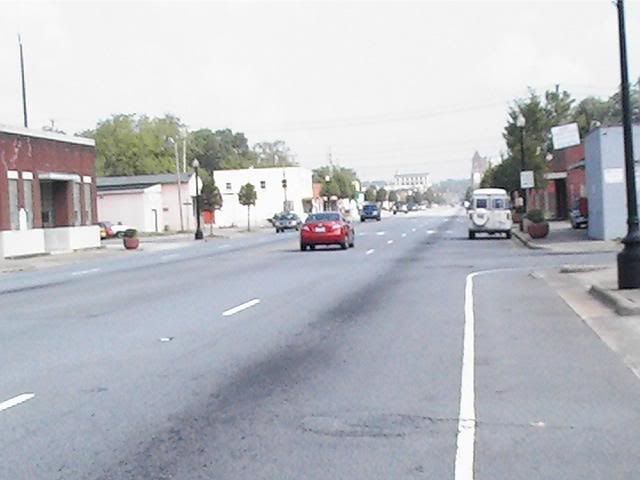
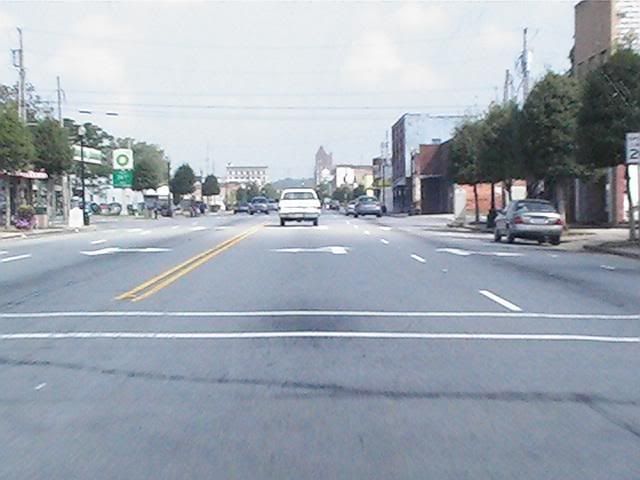
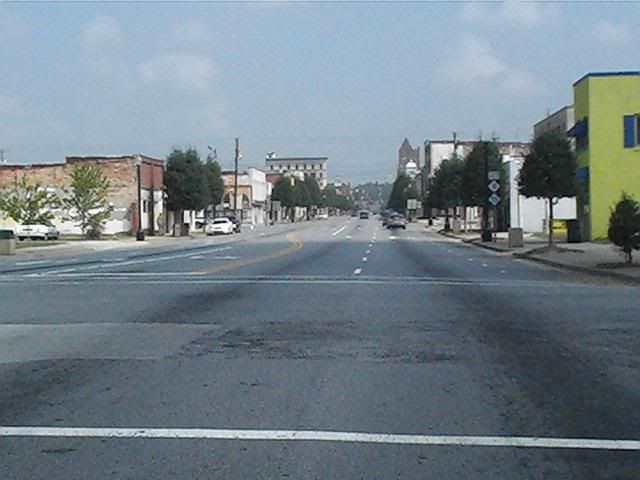

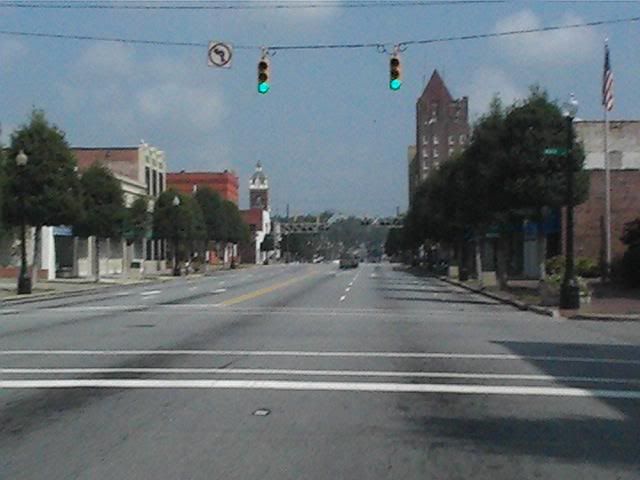
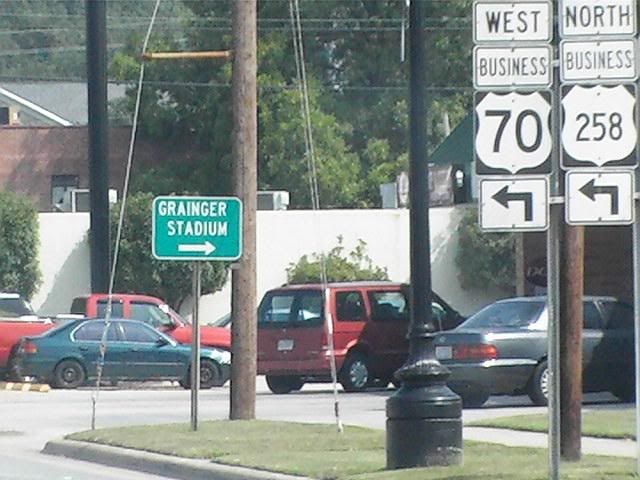
When I finally came to Grainger Stadium, the home of the Kinston Indians, the placement of the stadium and its age certainly caught my attention. The stadium butts up against a residential area where you could literally throw a baseball from left field into the front yards of the adjacent houses.
This area once thrived prior to the 1960s, as Kinston used to be a major tobacco hub where they produced five million pounds of tobacco a year. Also, a Du Pont plant provided many jobs at one time. But, after the 1960s the area went into decline as these businesses dried up.
It is just a completely different area where the demographics are completely flipped upside down compared to the teams in Mahoning Valley, Lake County, Akron and Buffalo. In those cities, team front office personnel target families and kids with all sorts of in-game promotions and contests geared at that market segment. In Kinston, however, their big draw is older and retired people, so they generally market their product to people 55 and older. The 2000 census said there were just under 24,000 people in the city, or which the racial makeup was 35.27% Caucasian, 62.34% African American, and 2.39% totaled several other races.
Here are a few pictures of the outside of the stadium: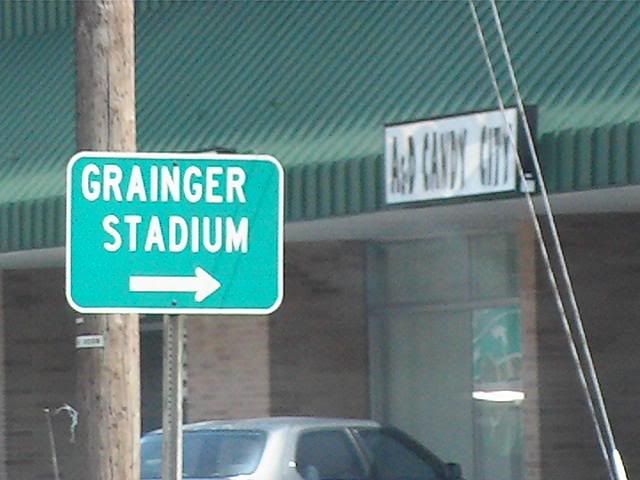
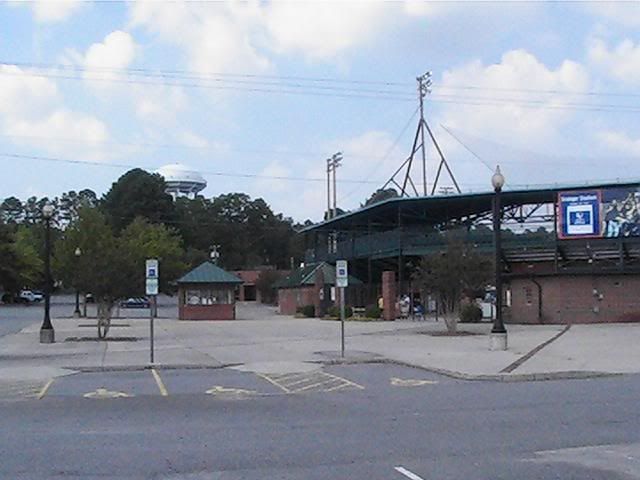
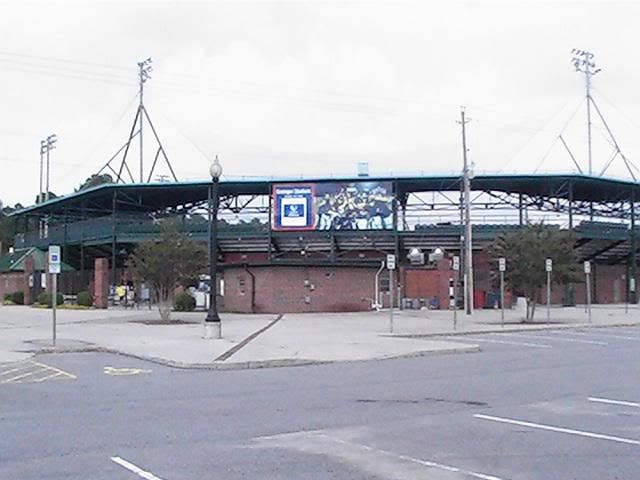
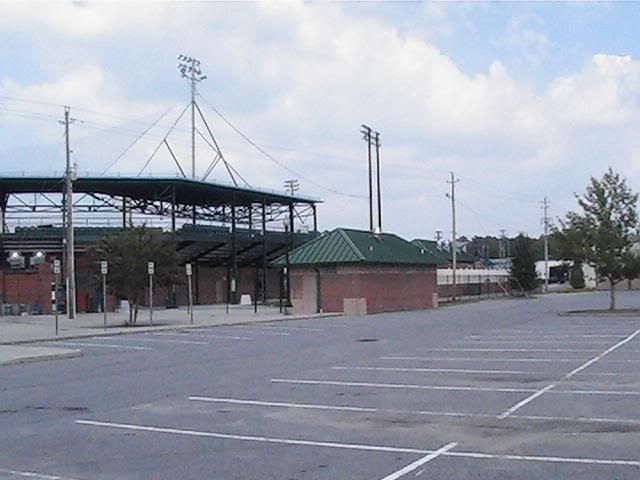
The stadium is completely different from any stadium in the system, and not surprisingly is the oldest stadium as it was built in 1949. An article on Grainger Stadium in Wikipedia provides a very good description of the stadium:
Grainger Stadium currently has a seating capacity of 4,100 which includes a covered grandstand of eight sections partially protected by netting, uncovered metal bleachers down the third base line, and several rows of uncovered seating along the first base line. There is also a picnic area with tables that have a full view of the playing field. Box seats stretch from first to third base just in front of the grandstand. With the exception of the metal bleachers, all seats in Grainger Stadium are formed plastic. The box seats are squared off sections bordered by metal piping with plastic folding chairs and have waitresses assigned to them. The closest seating is mere inches from the playing field while the furthest seats in the top row of the grandstand sit fifty-two feet, four inches from the action. During the days of segregation, section one of the grandstand and a now removed set of metal bleachers that sat adjacent to section one were areas designated for Kinston's black baseball fans.
The press box is a small little 8x20 wooden "shack", and it just adds to the intimacy of the ballpark that you just do not find anywhere else. The front office staff can be seen buzzing around back and forth talking with people, and David Hall who is the K-Tribe beat writer for the Kinston Free Press can be seen mingling with people in the stands before, during and after the game.
Here is a 360 degree view from inside the stadium:
Video 1: Grainger Stadium
Also, here are some pictures of the inside of the stadium:
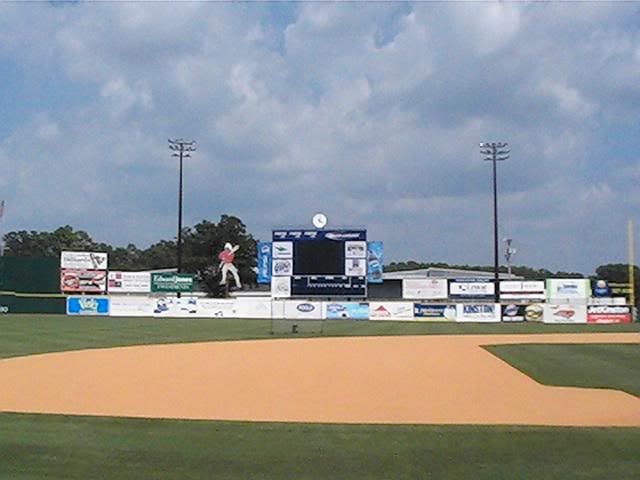
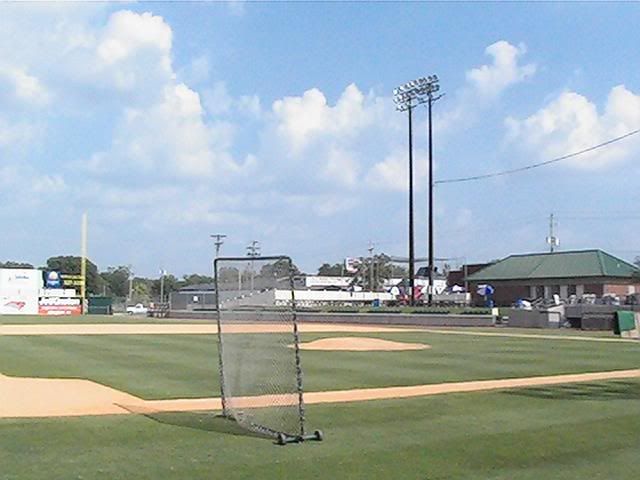
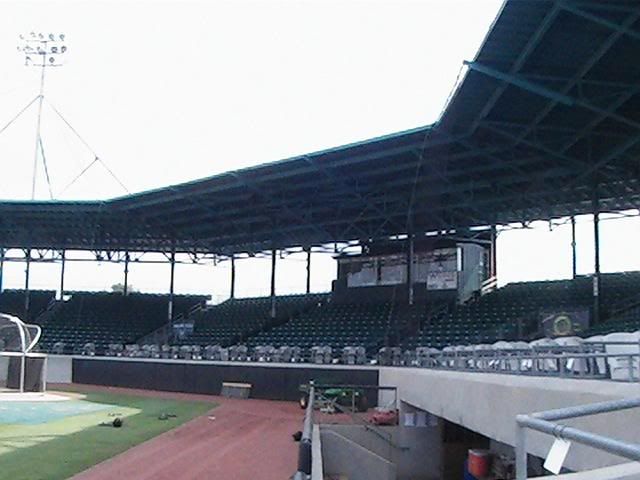
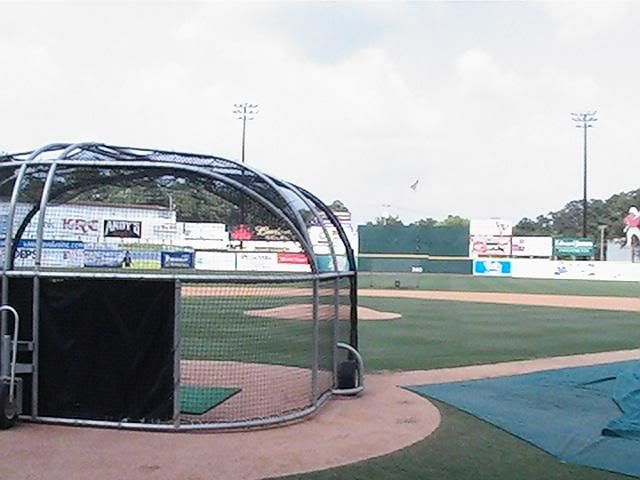
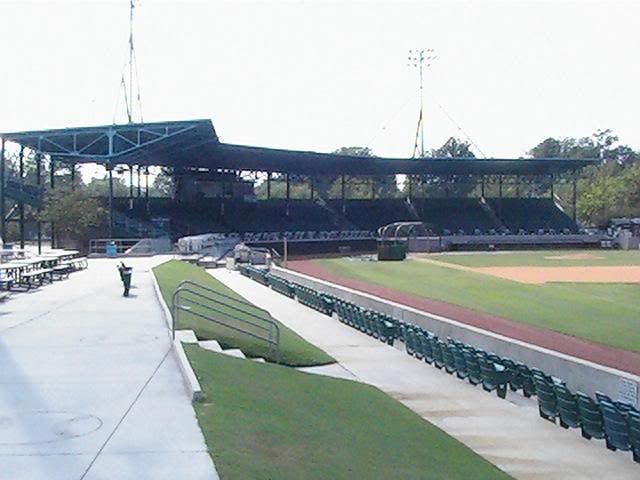
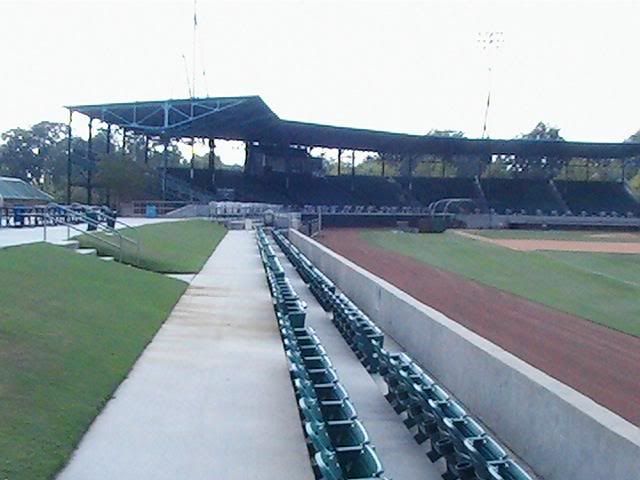
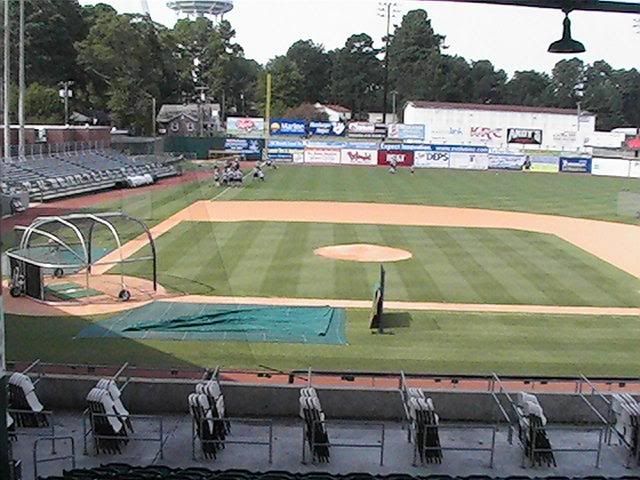
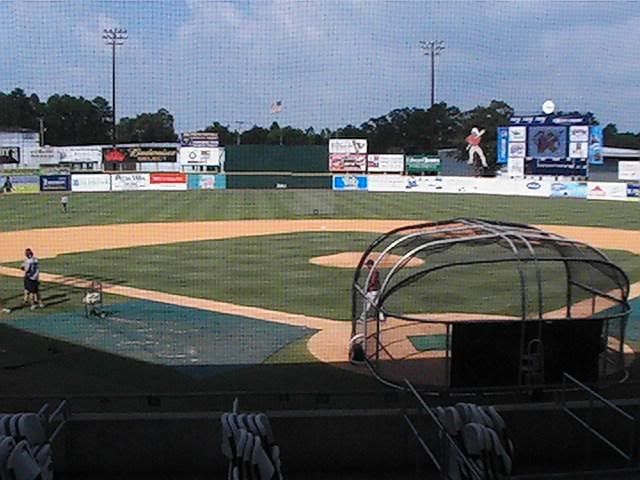
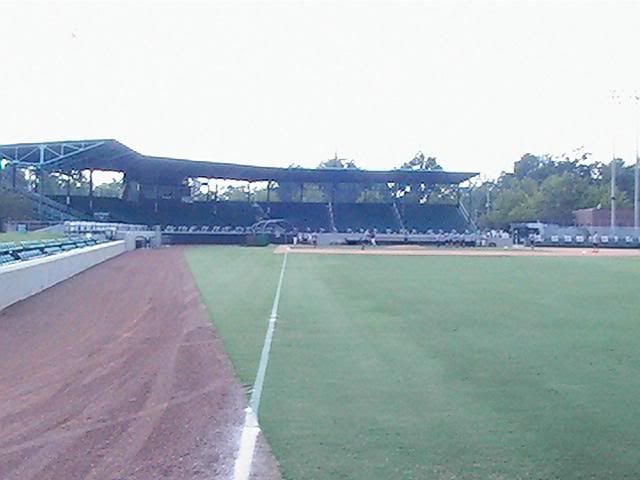
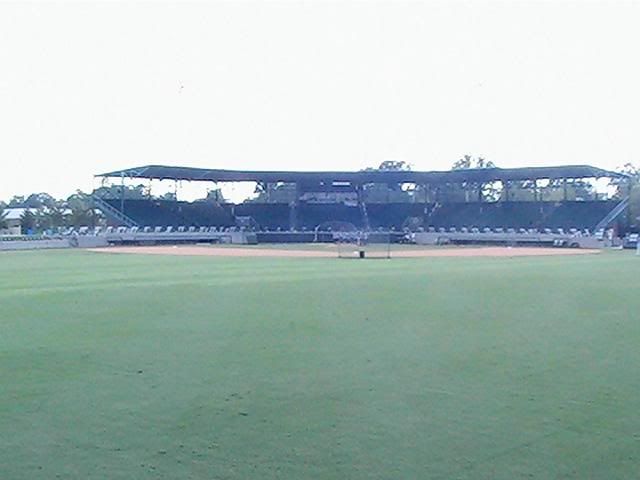
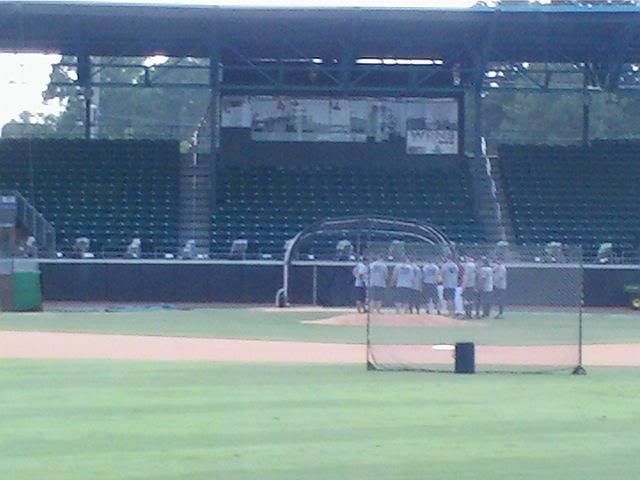
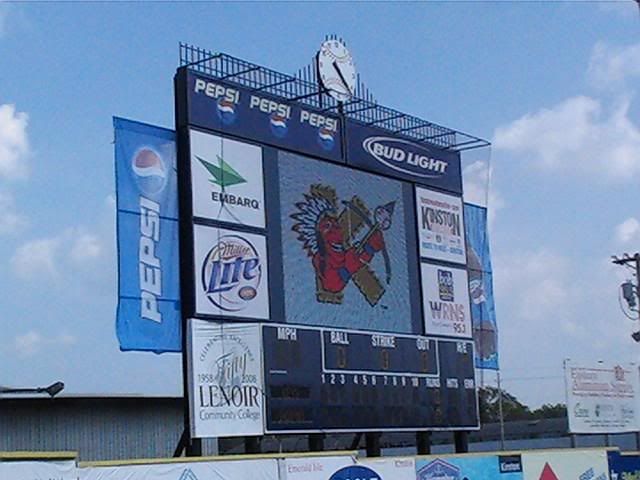
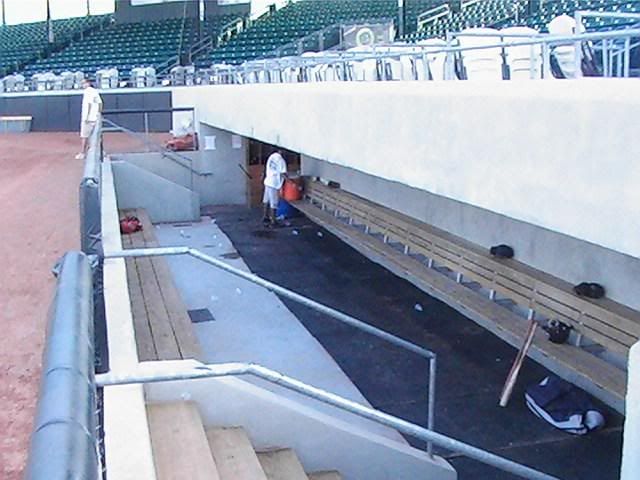
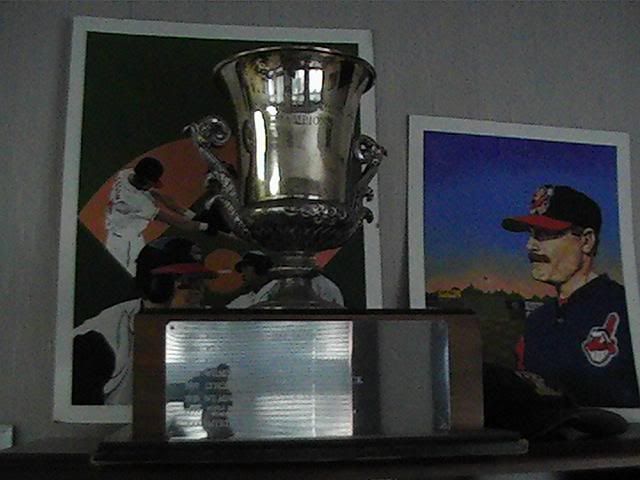
When I arrived my first day at Kinston, I was at the ballpark roughly three hours before gametime so I had a chance to walk around and checkout the park. Some of the things I noticed while walking around in the outfield is the outfield wall is made of concrete brick and has absolutely no padding. The only thing that covers the hard wall is the thin layer of material used to make the advertising banners that are hung all over the outfield fence. The ricochets off the wall from batted balls is ridiculous, as from what I saw in batting practice a ball would hit the wall and then end up back in the infield. Insane.
Also, the playing surface is top notch. Tommy Walston is the head groundskeeper and has done an award-winning job on the field where the grass is closely groomed to where it almost resembles a putting green. Looking at the field, it is no wonder it is consistently rated the top playing surface in the Carolina League and is considered one of the best playing fields in all of minor league baseball. The quality of the playing field is one of the big reasons the Cleveland Indians love their affiliation with Kinston.
Here are a few pictures of the opponent's bullpen, the Kinston bullpen, and the hitting cages: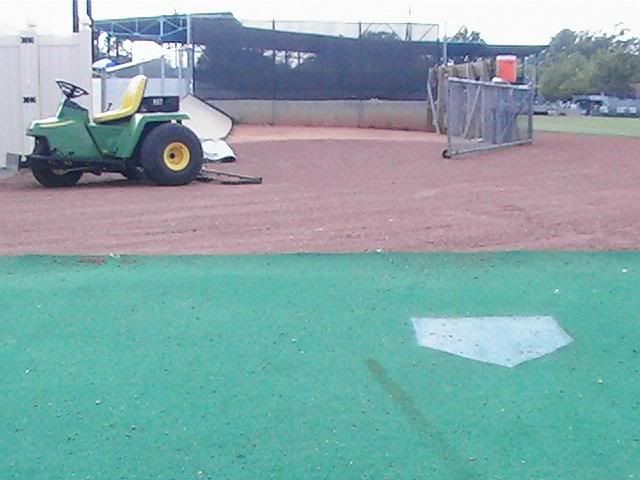
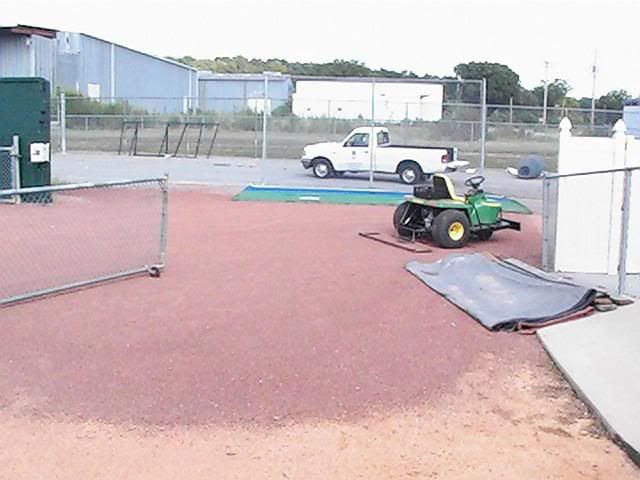
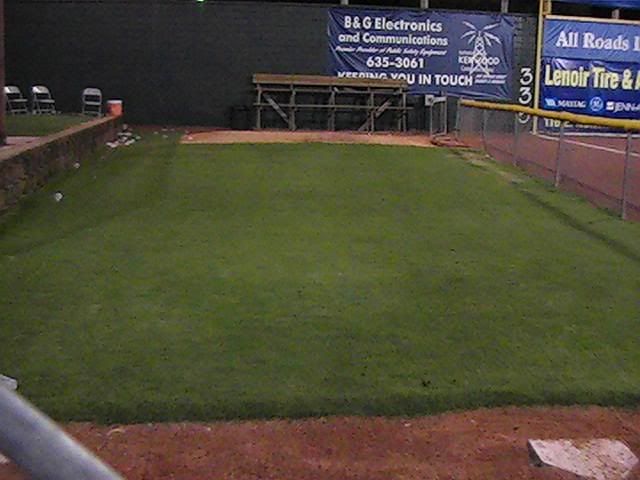
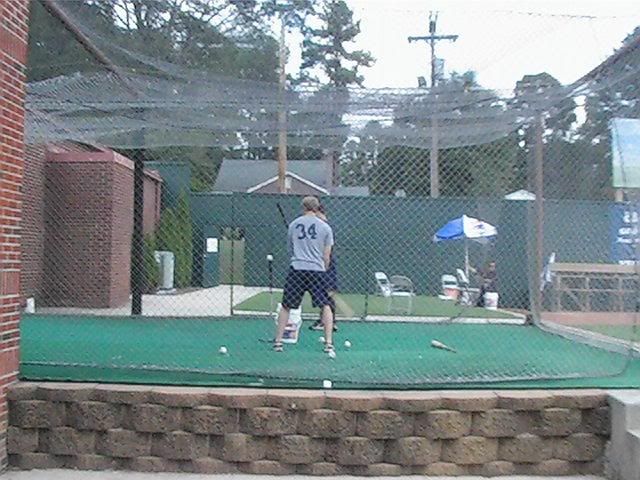
And here are a few shots from inside the small press box. One quick note, the scoreboard operator Delmont Miller (seated to the very far right corner in the first picture) is a legend at Granger Stadium. He has been running the scoreboard and is a diehard fan of the team for years. David Hall, the Kinston Free Press beat reporter, can be seen in the second picture on the far left.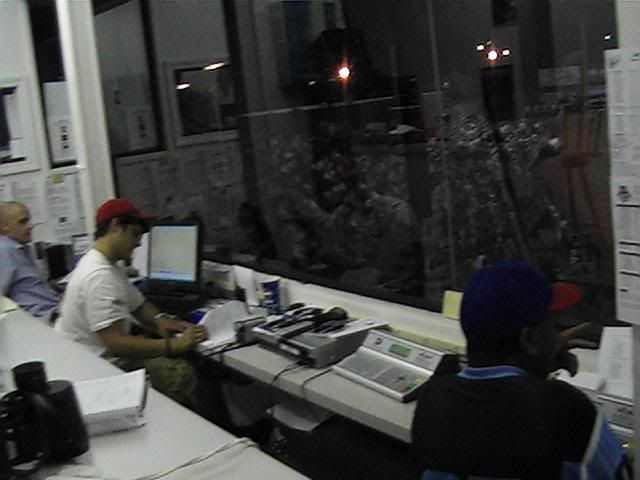
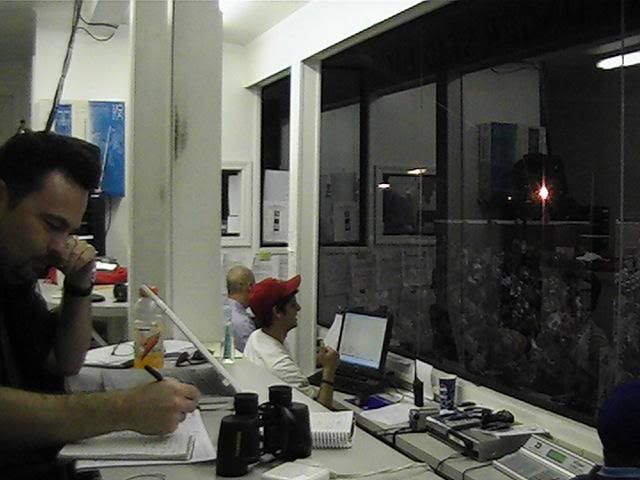
Moving on past the city and the stadium, I was not only there to take in the atmosphere, but also see the plethora of talent assembled in Kinston. The talent up and down the roster at Kinston year in and year out is always strong, and this year was no different as a lot of the Indians top prospects were littered up and down the Kinston roster.
After checking out the field and talking with the field staff and front office personnel, I was able to see the entire team go through batting practice, and took video of several players. To see them take batting practice, click on the links below:
Video 1: Matt Whitney
Video 2: John Drennen
Video 3: Jared Goedert
Video 4: Josh Rodriguez
Video 5: Jared Head
Video 6: Chris Gimenez
Here are some pictures of them in action in and around the cage, and taking infield:
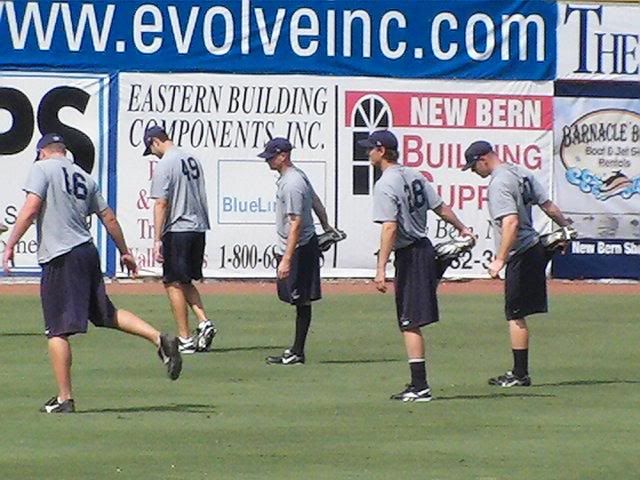
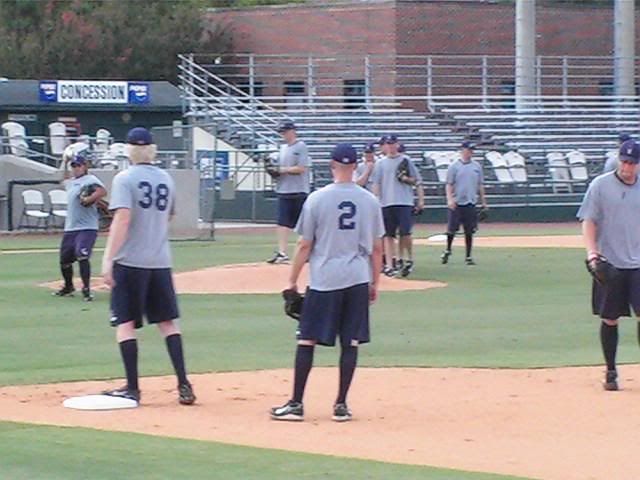
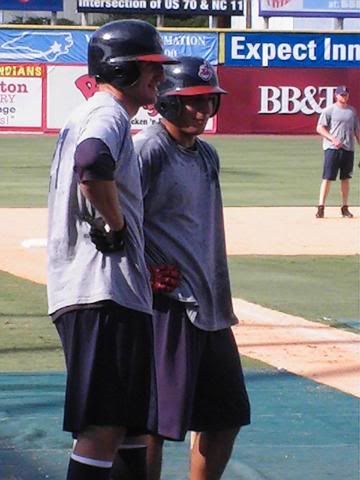
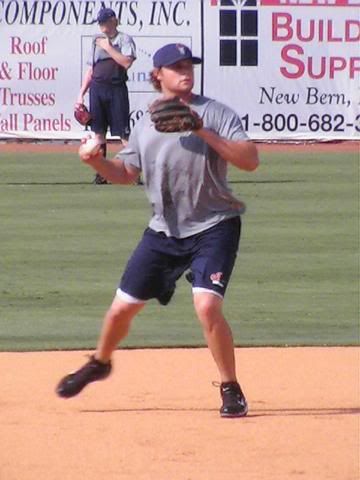
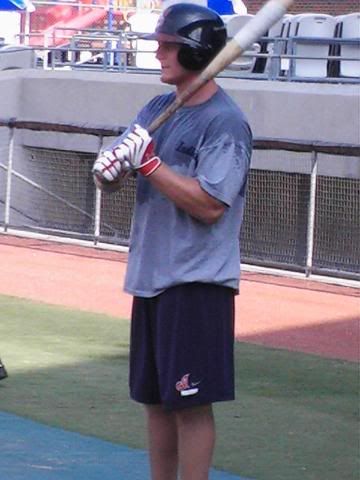
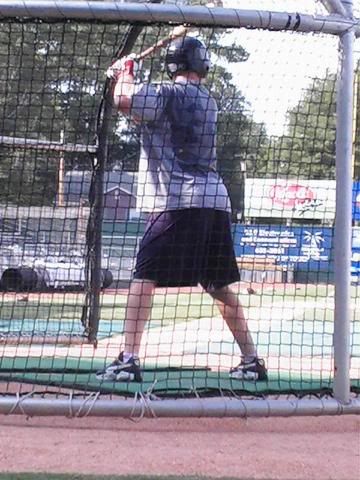
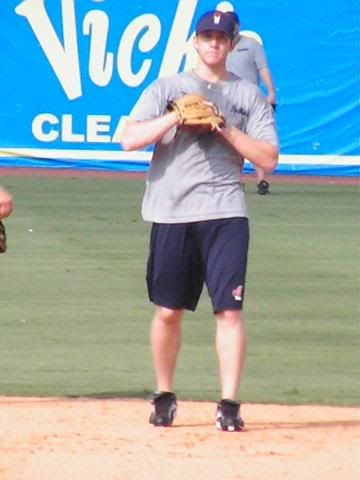
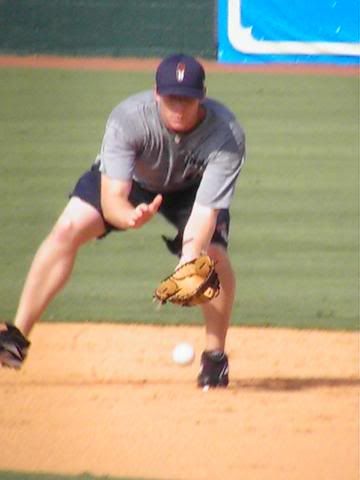
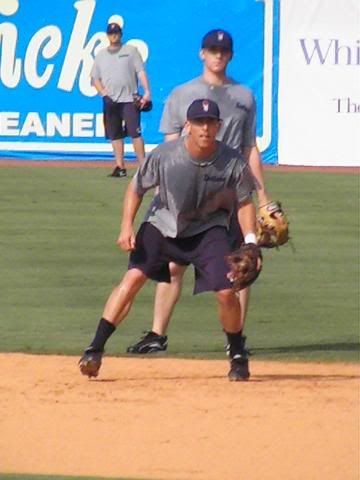
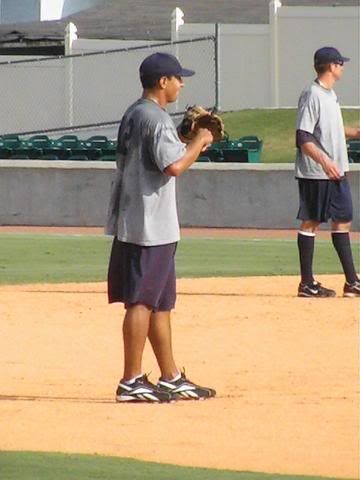
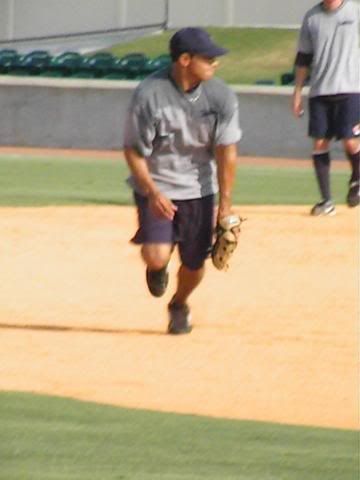
Once gametime rolled around, I was in and out of the press box all game to go down to field level and take in the action. I actually sat with the Kinston pitchers that were charting pitchers from behind homeplate, sitting with them for three to four innings both games I attended. In talking with right-handers Erik Stiller, Steven Wright and Josh Tomlin we talked about several topics in and out of baseball, as well as the cool electronic notebook-style computer they used to chart pitches. They would use a pointer to mark on the screen the location and speed of each pitch as well as other info, the computer would store it, and at the end of the game the information is downloaded into a computer where the Indians can easily view the results of the game from Cleveland and reports can be generated.
Before and after each game I was able to hang around the clubhouse and talk to several players and coaches. In addition to the plethora of players I talked to, I talked to manager Mike Sarbaugh, hitting coach John Nunnally, and Minor League Pitching Coordinator Dave Miller. I also talked with Assistant General Manager Jessie Hays and Director of Broadcasting Chris Hemeyer numerous times and they were extremely helpful in showing me around and setting up interviews with players. Hemeyer is the radio voice of the Kinston Indians, and I even appeared on his pre-game radio show for 10-15 minutes before a game to talk about the Indians prospects and the minor league road trips I had been undertaking.
As for the players, I was able to take tons of video and pictures of several of them in action. Here are some videos of several pitchers in action:
Video 1: Frank Herrmann
Video 2: T.J. Burton
Video 3: Jim Deters
Video 4: Neil Wagner #1
Video 5: Neil Wagner #2
Here are pictures of the pitchers in action: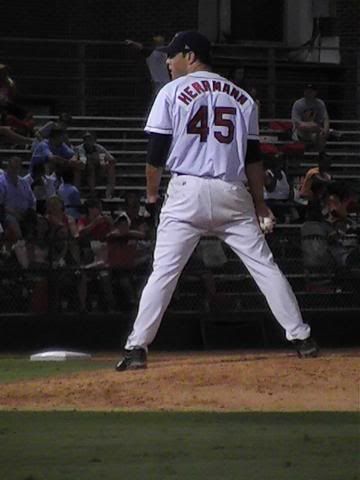
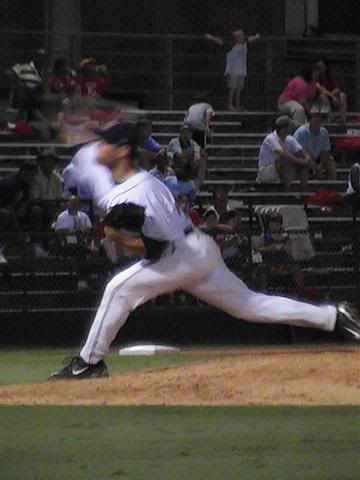
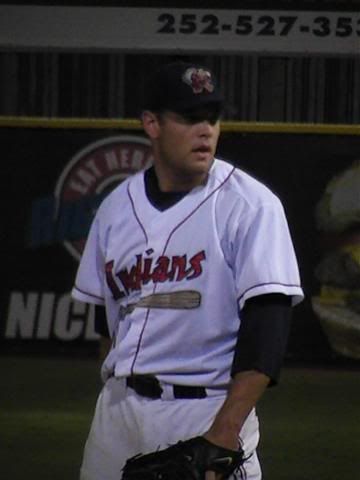
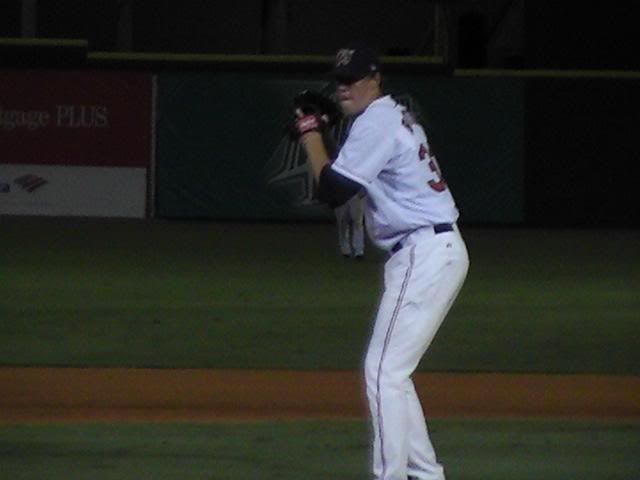
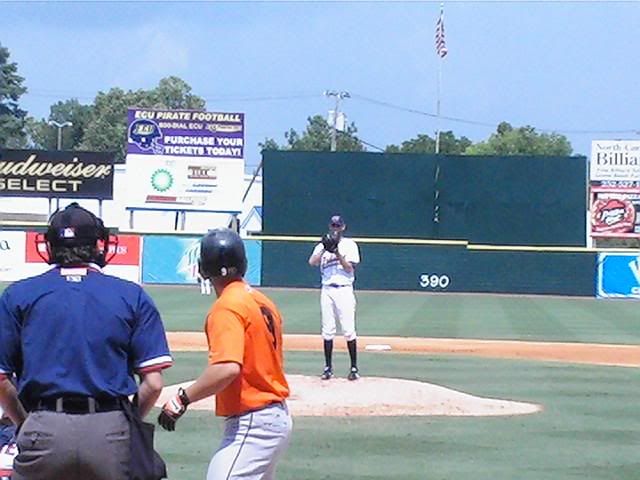
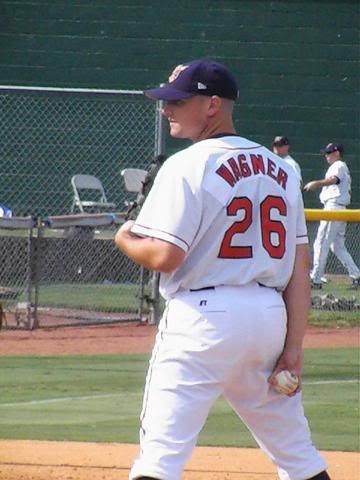
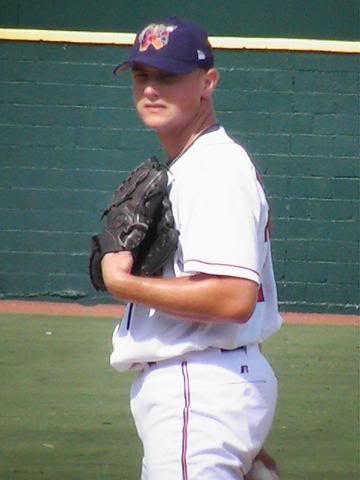
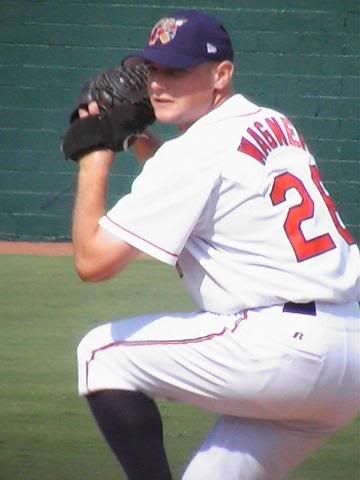
The Kinston lineup was loaded up and down with several of the parent-club Indians best prospects. Here are a couple videos of third baseman Matt Whitney in action:
Video 1: Matt Whitney #1
Video 2: Matt Whitney #2 (he hits a home run)
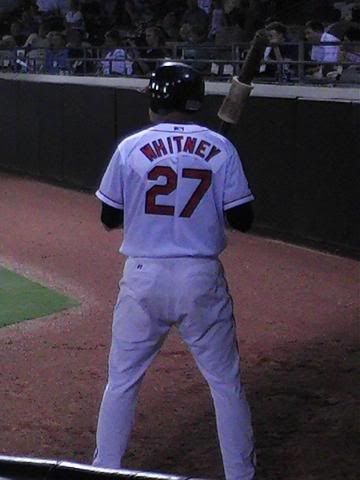
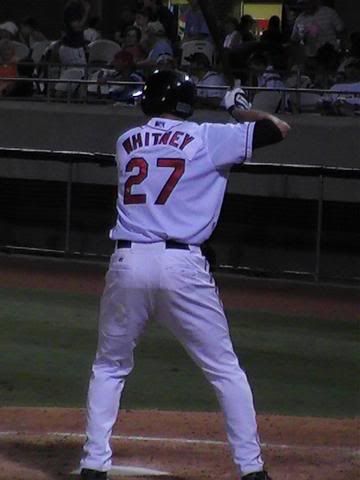
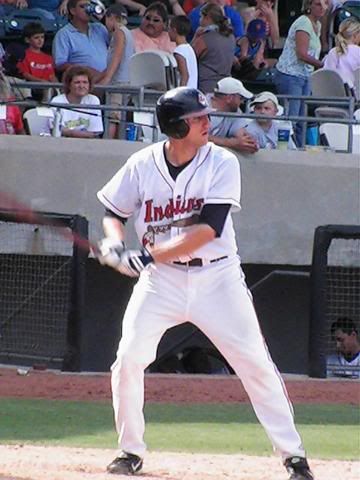
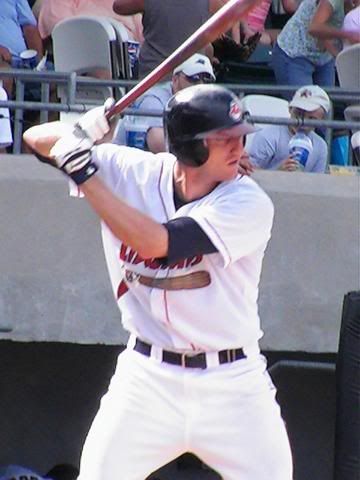
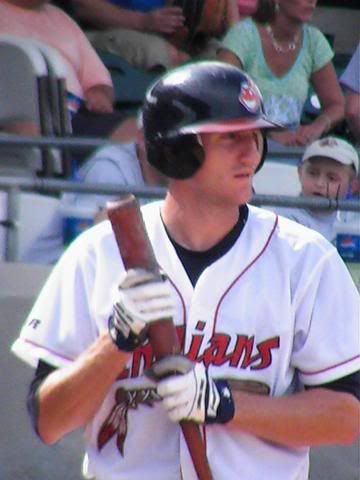
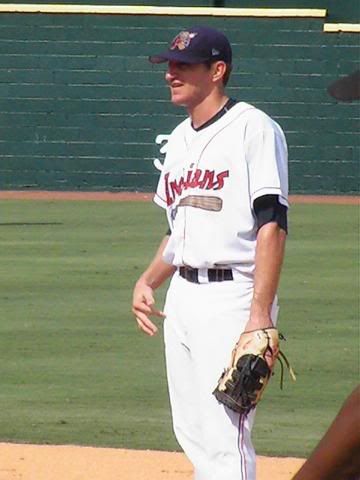
Here are some videos of speedy and scrappy outfielder Jose Constanza:
Video 1: Jose Constanza #1
Video 2: Jose Constanza #2
Video 3: Jose Constanza #3
Here are some pictures of Constanza in action: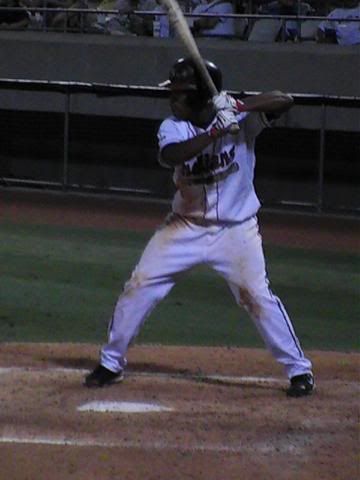
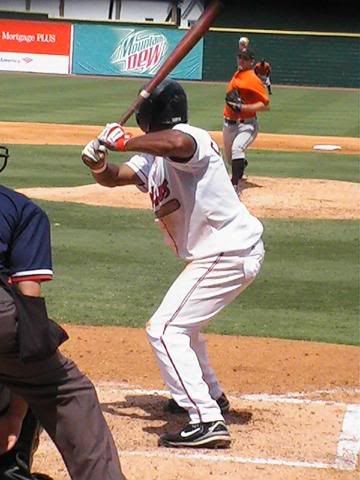
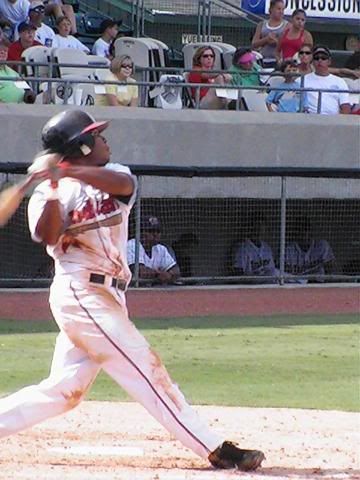
Here are some videos of shortstop Josh Rodriguez in action:
Video 1: Josh Rodriguez #1
Video 2: Josh Rodriguez #2
Here are some pictures of Rodriguez in action: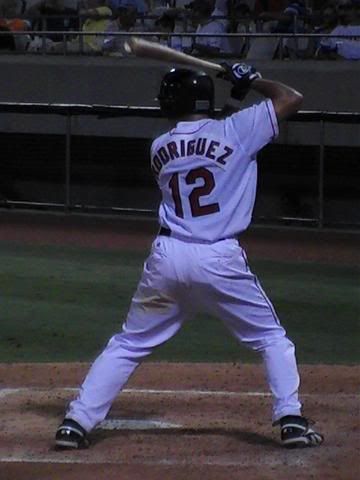
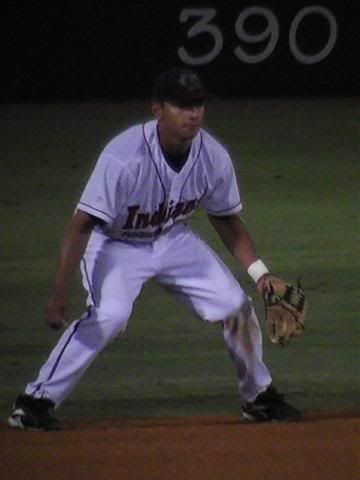
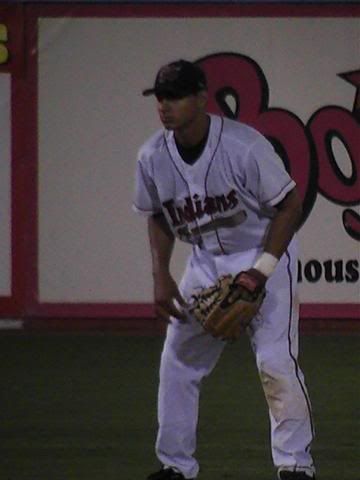
Here some videos of 2007 first round draft pick Beau Mills in action at the plate:
Video 1: Beau Mills #1
Video 2: Beau Mills #2
Here are some pictures of Mills in action: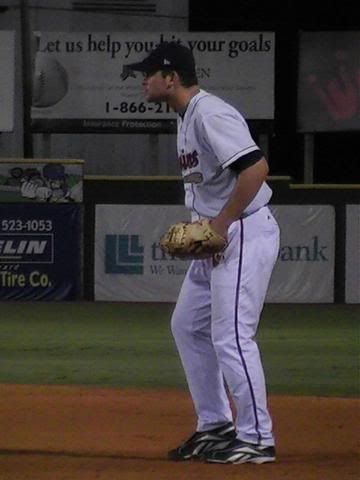
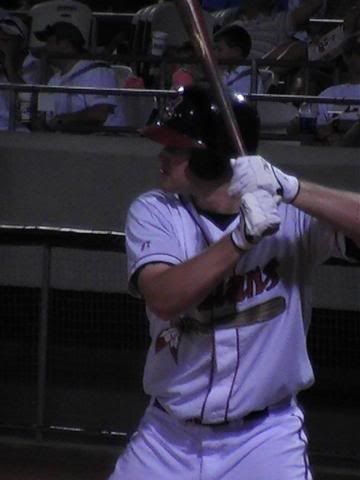
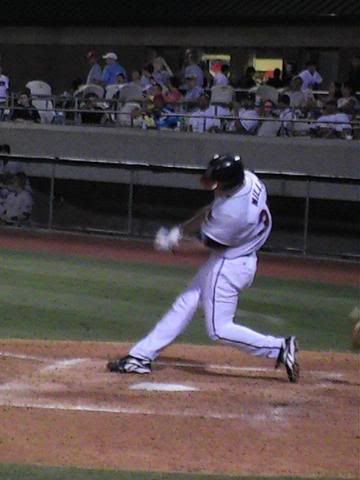
Here are some videos of outfielder John Drennen in action at the plate:
Video 1: John Drennen #1
Video 2: John Drennen #2
Video 3: John Drennen #3
And, here is a collection of various players at the plate:
Video 1: Mike Butia
Video 2: Brian Finegan
Video 3: Jared Head
Video 4: Chris Giminez
Video 5: Wes Hodges
And, finally, here is a random assortment of pictures for various players: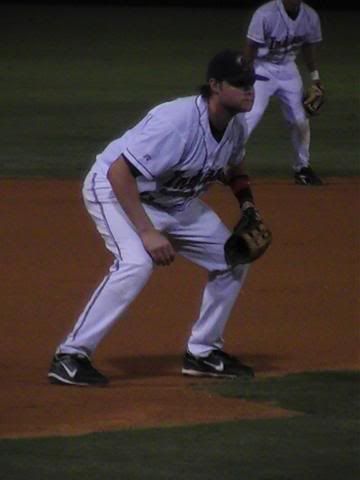
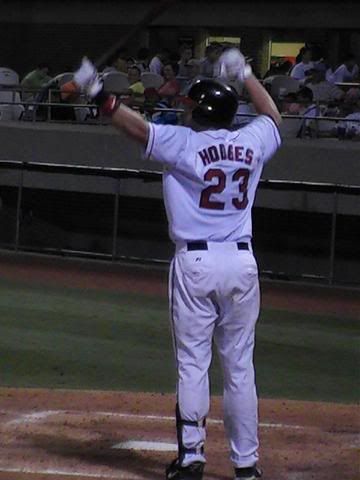
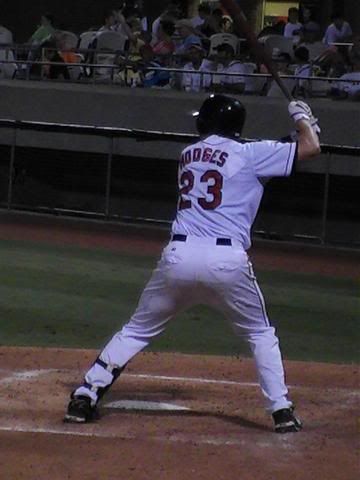
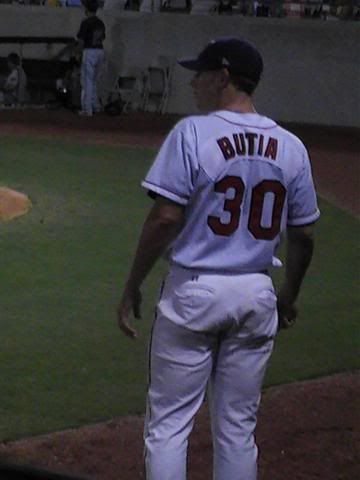
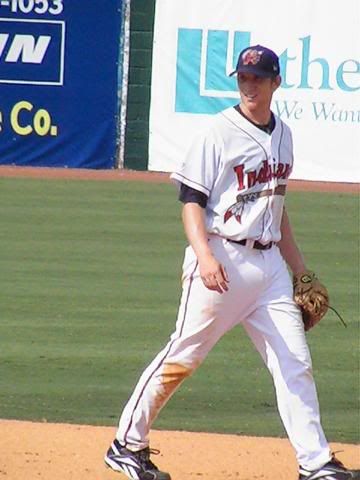
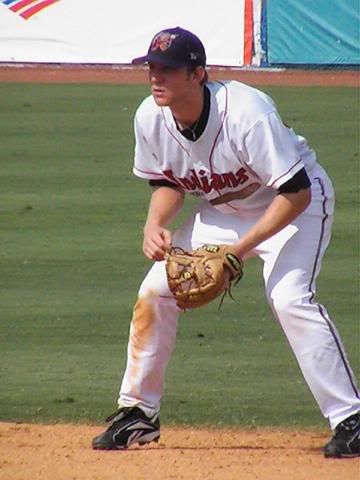
Kinston may be a lot different from the other affiliates, but the lack of distractions really helps the players concentrate on baseball. This is also something the Indians love about the setup in Kinston. And, after visiting the town and the facility, I have to agree. As far as baseball goes, you can't really top the excellent work the Kinston front office does in providing a great gameday experience, and the quality of play on the field is very good.
This was my last stop on my seven week roadtrip where I visited all six of the Indians minor league affiliates in seven weeks. When I setup this trip to get around and visit the teams and build a rapport with the players that I will be covering the next several years, I put Kinston as the last stop expecting it to be the best. And, you know what? I have to say of all the stops, my expectations rang true as not only was the location unique, but the entire experience with the players, front office, and game were the best of any stop.
I can't wait to come back next year.
- NBA Announces 2013-2014 Schedule
- Browns Ink Sharknado
- Sharknado A No-Show For Rookie Camp
- Trent Richardson Out Until Training Camp
- Browns Sign Brandon Jackson
- Carrasco Suspended Eight Games
- Browns Add to Wide Receiver Depth with David Nelson
- Browns Need to Learn from Past Draft Mistakes
- Browns Release Chris Gocong and Usama Young
- Browns Missing on Grimes Disappointing, But Not The End
The TCF Forums
- Official- Browns Coach Search/Rumors
Larvell Blanks (Tuesday, January 21 2014 11:53 AM) - The 2014 Offseason Thread
skatingtripods (Tuesday, January 21 2014 11:52 AM) - Chris Grant's first 3 drafts
Kingpin74 (Tuesday, January 21 2014 10:13 AM) - 2015 Recruiting
furls (Tuesday, January 21 2014 6:57 AM) - Mike Brown
YahooFanChicago (Monday, January 20 2014 11:15 PM) - Movies coming out
HoodooMan (Monday, January 20 2014 9:34 PM) - 2014 Hoops Hockey Hijinx
jpd1224 (Monday, January 20 2014 4:44 PM) - 2014 Recruiting
jclvd_23 (Monday, January 20 2014 2:26 PM) - Wish List - #4 Pick
Hikohadon (Monday, January 20 2014 1:26 PM) - #1 overall pick Anthony Bennett
TouchEmAllTime (Sunday, January 19 2014 1:28 PM)


